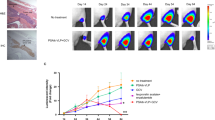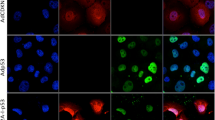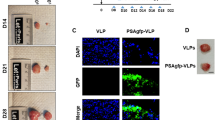Abstract
Bcl-2 is associated with resistance to radiotherapy in prostate cancer. It was recently demonstrated that transduction of LNCaP prostate cells with the PTEN gene resulted in Bcl-2 downregulation. We hypothesized that forced expression of PTEN in prostate cancer cells would sensitize cells to radiation, downregulate Bcl-2 expression, and potentiate the G2M block induced by radiation. Four cell lines — PC-3-Bcl-2 (Bcl-2 overexpression, deleted PTEN), PC-3-Neo (wild-type Bcl-2, deleted PTEN), LNCaP (Bcl-2 overexpression, deleted PTEN), and DU-145 (wild-type Bcl-2 and PTEN) — were transduced with a recombinant adenovirus-5 vector expressing the human wild-type PTEN cDNA under the control of a human cytomegalovirus promoter (Ad-MMAC). After correction for the effect of Ad-MMAC on plating efficiency, Ad-MMAC treatment reduced the surviving fractions after 2 Gy as follows: PC-3-Bcl-2, from 60.5 to 3.6%; PC-3-Neo, no reduction; LNCaP, from 29.6 to 16.3%; and DU-145, from 32.7 to 25.7%. PTEN expression was associated with the downregulation of Bcl-2 expression in PC-3-Bcl-2 and LNCaP cell lines. Ad-MMAC plus radiotherapy potentiated the G2M block seen with radiotherapy alone only in PC-3-Bcl-2 cells. These findings suggest that overexpression of Bcl-2 result in radioresistance and inability of radiation to cause its typical G2M cell-cycle arrest.
This is a preview of subscription content, access via your institution
Access options
Subscribe to this journal
Receive 12 print issues and online access
$259.00 per year
only $21.58 per issue
Buy this article
- Purchase on Springer Link
- Instant access to full article PDF
Prices may be subject to local taxes which are calculated during checkout




Similar content being viewed by others
References
Rosser CJ, Reyes AO, Vakar-Lopez F, et al. p53 and Bcl-2 are over-expressed in localized radio-recurrent carcinoma of the prostate. Int J Radiat Oncol Biol Phys. 2003;56:1–6.
Cheng L, Sebo TJ, Cheville TM, et al. p53 protein overexpression is associated with increased cell proliferation in patients with locally recurrent prostate carcinoma after radiation therapy. Cancer. 1999;85:1293–1299.
Grossfield GD, Olumi AF, Connolly JA, et al. Locally recurrent prostate tumors following either radiation therapy or radical prostatectomy have changes in Ki-67 labeling index, p53 and bcl-2 immunoreactivity. J Urol. 1998;159:1437–1443.
Huang A, Gandour-Edwards R, Rosenthal SA, Siders DB, Deitch AD, Devere White RW . p53 and bcl-2 immunohistochemical alterations in prostate cancer treated with radiation therapy. Urology. 1998;51:346–351.
Prendergast NJ, Atkins MR, Schatte EC, Paulson DF, Walther PJ . p53 immunohistochemical and genetic alterations are associated at high incidence with post-irradiated locally persistent prostate carcinoma. J Urol. 1996;155:1685–1692.
Rakozy C, Grignon DJ, Sarkar FH, Sakr WA, Littrup P, Forman J . Expression of bcl-2, p53, and p21 in benign and malignant prostatic tissue before and after radiation therapy. Mod Pathol. 1998;11:892–899.
Scherr DS, Vaughn ED, Wei J, et al. Bcl-2 and p53 expression in clinically localized prostate cancer predicts response to external beam radiotherapy. J Urol. 1999;162:12–17.
Huang H, Cheville JC, Pan Y, Roche PC, Schmidt LJ, Tindall DJ . PTEN induces chemosensitivity in PTEN-mutated prostate cancer cells by suppression of Bcl-2 expression. J Biol Chem. 2001;276:38830–38836.
Steck PA, Pershouse MA, Jasser SA, et al. Identification of a candidate tumor suppressor gene, PTEN at chromosome 10q23.3 that is mutated in multiple advanced cancers. Nat Genet. 1997;15:356–362.
Li J, Yen C, Liaw D, et al. PTEN, a putative protein tyrosine phosphatase gene mutated in human brain, breast, and prostate cancer. Science. 1997;275:1943–1947.
Wick W, Furnari FB, Naumann U, Cavenee WK, Weller M . PTEN gene transfer in human malignant glioma: sensitization to irradiation and CD95L-induced apoptosis. Oncogene. 1999;18:3936–3943.
Alessi DR, Cohen P . Mechanism of activation and function of protein kinase B. Curr Opin Genet Dev. 1998;8:55–62.
Davies MA, Koul D, Dhesi H, et al. Regulation of Akt/PKB activity, cellular growth, and apoptosis in prostate carcinoma cells by MMAC/PTEN. Cancer Res. 1999;59:2551–2556.
Tanaka M, Koul D, Davies MA, Liebert M, Steck PA, Grossman HB . MMAC1/PTEN inhibits cell growth and induces chemosensitivity to doxorubicin in human bladder cancer cells. Oncogene. 2000;19:5406–5410.
Tanaka M, Grossman HB . PTEN gene therapy on human bladder cancer: induction of growth suppression, apoptosis, and synergy with doxorubicin. Gene Ther. 2003;10:1636–1642.
Lowe SW, Schmitt EM, Smith SW, Osborne BA, Jacks T . p53 is required for radiation-induced apoptosis in mouse thymocytes. Nature. 1993;362:847–849.
Acknowledgements
Stephanie Deming and Dr Kwai Wa Cheng for his careful review of the manuscript. This work was supported by American Foundation of Urologic Disease grant and National Cancer Institute Grants CA56973 and CA16672.
Author information
Authors and Affiliations
Corresponding author
Rights and permissions
About this article
Cite this article
Rosser, C., Tanaka, M., Pisters, L. et al. Adenoviral-mediated PTEN transgene expression sensitizes Bcl-2-expressing prostate cancer cells to radiation. Cancer Gene Ther 11, 273–279 (2004). https://doi.org/10.1038/sj.cgt.7700673
Received:
Published:
Issue Date:
DOI: https://doi.org/10.1038/sj.cgt.7700673
Keywords
This article is cited by
-
Combining PARP inhibitors with radiation therapy for the treatment of glioblastoma: Is PTEN predictive of response?
Clinical and Translational Oncology (2017)
-
Emerging roles of radioresistance in prostate cancer metastasis and radiation therapy
Cancer and Metastasis Reviews (2014)
-
Radiosensitization in prostate cancer: mechanisms and targets
BMC Urology (2013)
-
Molecular fingerprinting of radiation resistant tumors: Can we apprehend and rehabilitate the suspects?
BMC Cancer (2009)
-
Docetaxel and bortezomib downregulate Bcl-2 and sensitize PC-3-Bcl-2 expressing prostate cancer cells to irradiation
World Journal of Urology (2008)



